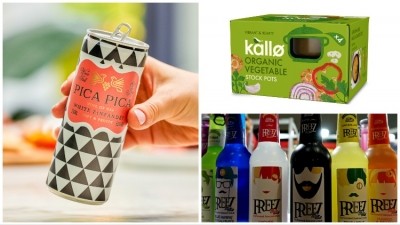Long read
The importance of independent sensory labs in NPD

A misstep in new product development (NPD) can damage your brand and bottom line, with studies estimating that more than £30m is wasted each year on failed food and beverage launches.
Independent sensory labs are critical in mitigating this risk, offering impartial insights that can significantly impact a product's success.
What is sensory testing?
Sensory testing involves evaluating food products based on their sensory attributes, such as taste, aroma, texture and appearance. This type of testing is essential for creating new products that resonate with consumers, ensuring batch consistency and high standards, and refining existing products based on consumer feedback.
Sensory analysis plays a crucial role at every stage of NPD.
- Opportunity identification
- Product design and development
- Testing
- Launch
How sensory testing can be used in NPD
Alison Friel, director of technical services at NSF, underscored the crucial role sensory analysis plays in identifying characteristics that appeal to target demographics.
“This information can be used to optimise recipes, select the best raw materials, and refine processing methods,” she said. “Independent testing ensures that these decisions are based on objective, reliable data in addition to helping maintain consistent product quality which is essential for building brand loyalty and ensuring regulatory compliance.
“Independent sensory testing objectively assesses product quality, helping manufacturers identify and address potential issues before products reach the market. This proactive approach reduces the risk of product recalls and enhances consumer trust.
“Sensory data can be used to benchmark products against competitors, identify unique selling points, and develop marketing claims that resonate with consumers. Independent testing ensures that these claims are backed by credible, unbiased data.”
When NSF recently opened its new European headquarters in Brussels, the first use of its cutting-edge sensory lab was a ‘Mastercooks of Belgium’ testing session, organised with Carrefour. The session featured 10 of Belgium’s top chefs, evaluating a range of Carrefour food products. It also marked the 10-year partnership between Carrefour and the Belgium Association of Mastercooks, which, to date, has resulted in almost 200 Carrefour products being approved by Mastercooks.
“The Mastercook session aligns closely with Carrefour's product development and quality assurance goals by leveraging the expertise of distinguished chefs to ensure our products meet the highest standards of taste and quality,” explained Christelle Tchonang Ponka, food quality & sustainable development manager at Carrefour. “Through this partnership, 10 Masterchefs from Belgium rigorously test a selection of our Carrefour-branded products. Their approval allows us to confidently label these products with the ‘Selected by Mastercooks’ logo, signifying exceptional quality to our customers.
“This collaboration not only enhances our product development process by incorporating valuable feedback from culinary experts but also reinforces our commitment to providing superior products. The Mastercook endorsement acts as a testament to our dedication to quality assurance, helping us maintain customer trust and satisfaction over the long term.”
NSF's test kitchens are equipped with semi-professional equipment, enabling accurate replication of the conditions and equipment used in domestic kitchens. This setup ensures that products are tested in environments that closely mimic how consumers will use them, providing more relevant and actionable insights.
Ponka added: "Taste is the priority in the quality of Carrefour products. To ensure this, it is important for us to conduct tests in a high-quality laboratory. NSF's sensory testing services provide objective, scientific assessments of our products' sensory attributes, such as taste, texture, and appearance.
“This rigorous testing helps us identify areas for improvement and fine-tune our products to better meet consumer preferences. Moreover, the data and insights gained from these tests support our commitment to continuous innovation and excellence in product development.”
Choosing an independent sensory lab
Independent sensory testing adds significant value to the NPD process by providing objective feedback and offering unbiased and reliable assessments of a product's potential success.
“Sensory testing is an ongoing process that plays a crucial role in extending a product's lifecycle,” Friel explained. “By applying taste evaluations and benchmark tests as part of your NPD process, manufacturers can better predict a product's success before it ever hits store shelves. Regularly reviewing a product’s attributes, composition, nutritional values, and, most importantly, taste, can significantly extend its market relevance and boost the return on investment in research and design.
“Outsourcing sensory analysis to independent laboratories can be more cost-effective than maintaining an in-house sensory team and laboratory. Third-party labs have the expertise, equipment, and resources to conduct comprehensive sensory evaluations efficiently. This allows manufacturers to focus on their core competencies while still benefiting from high-quality sensory data.”
When choosing an independent food sensory lab, manufacturers should consider several critical factors to ensure they receive high-quality and reliable results. Firstly, the lab's accreditation and certifications, such as ISO 9001, are essential indicators of its technical competence and adherence to international standards. Expertise and experience in the specific food category being tested are crucial, as different products require distinct sensory evaluation methods.
Additionally, manufacturers should verify the lab's capability to provide detailed, actionable data analysis and interpretation, helping to translate sensory findings into meaningful insights for product development and quality control. Transparent communication and a proven track record of working with reputable clients further underscore the lab's reliability and credibility.
As the food industry continues to evolve, the importance of reliable sensory analysis will only increase, making independent testing an invaluable tool for achieving excellence in food quality and consumer satisfaction.
You might also enjoy - NPD: Understanding the 'most important' process in food manufacturing.


























